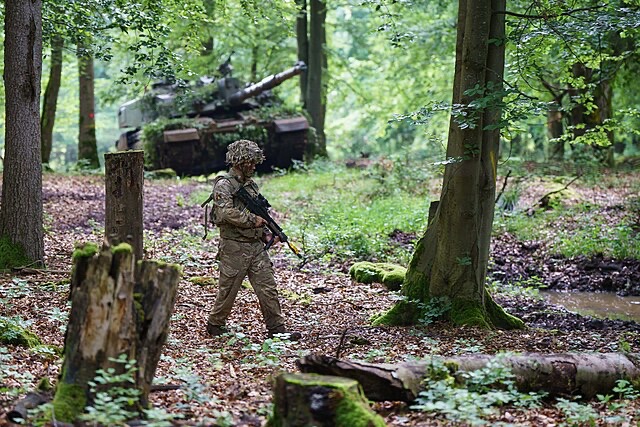Troops Banned from Flying Drones Over Colleagues — Even in Tanks
British soldiers preparing for high-risk missions near the Russia-Ukraine frontline are facing baffling restrictions during their drone training—some so extreme that they are banned from flying unmanned aerial vehicles over fellow troops, even when those troops are sitting inside armored tanks.
Training exercises at Salisbury Plain, one of the UK’s most vital military zones, have reportedly been disrupted by health and safety rules that prevent drones weighing over 250 grams from flying over people. The result? Soldiers can’t simulate battlefield scenarios where drones are routinely operated overhead, rendering parts of their preparation incomplete.
Sources inside the base revealed that permission must be painstakingly requested from the Military Aviation Authority to fly a drone over a tank—even an empty one. This excessive red tape has sparked growing concern among military experts and members of Parliament.
Restrictions on Jamming Leave Soldiers Ill-Prepared for Combat
Equally worrying is the army’s inability to practise jamming enemy signals—a tactic now standard in drone warfare. The Ministry of Defence has blocked jamming exercises at Salisbury Plain over concerns that it could disrupt satnavs and local electronics, including those used by civilians in Wiltshire towns surrounding the base.
Without these exercises, UK troops are being sent to the most drone-saturated battlefield in the world—Ukraine—without experience in basic counter-drone tactics. These include signal interference and the deployment of anti-drone systems that are vital for survival in the modern war theatre.
The inability to train for real-world scenarios like frequency jamming or aerial surveillance puts British personnel at a distinct disadvantage compared to their Ukrainian counterparts, who train and fight with drones daily under live conditions.
Troop Morale and Readiness in Question as Restrictions Clash with Reality
Soldiers Forced to Buy Own Drone Tech to Train Themselves
Faced with an alarming training gap, some soldiers have taken matters into their own hands. Labour MP Fred Thomas, a member of the Commons Defence Select Committee, revealed that UK troops are resorting to online purchases of commercial jamming equipment to experiment and teach themselves these critical battlefield skills.
“They are literally buying kit online and tinkering with it on their own time,” Thomas told the Financial Times. “This kind of training is bog-standard in the Middle East and Ukraine. Our guys are being sent out without it.”
The issue has raised serious questions about the Ministry of Defence’s preparedness strategy. Soldiers are expected to operate high-tech drones and manage complex electromagnetic threats in war zones without having rehearsed them safely in the UK first.
Defence Committee: “This is Standard Training in Ukraine, Not Optional”
Thomas and other defence experts argue that current health and safety restrictions are no longer compatible with the operational demands of modern warfare. In warzones like Ukraine, drones are a staple of daily combat. They’re used for reconnaissance, targeting, supply delivery, and even direct attacks via grenade drops or kamikaze flights.
“This is not advanced training; it’s basic survival,” said one former military trainer. “If we’re deploying troops to the frontlines of the Ukraine conflict, we cannot afford to let them go without drone combat training—full stop.”
Salisbury Plain Controversy Highlights Wider Military Readiness Gap
Repeated Bureaucratic Delays and MoD Red Tape
The situation at Salisbury Plain is a symptom of a broader issue: over-cautious bureaucracy strangling innovation and readiness. Defence insiders have long warned that the MoD’s regulatory culture—designed to minimize risk—often obstructs the training needed to face actual combat conditions.
Requests to conduct drone exercises over empty vehicles or to initiate signal-jamming drills are subject to layers of approvals and risk assessments. Some exercises have been delayed for weeks or cancelled altogether due to a single safety concern, even when no real threat to personnel exists.
As one senior officer anonymously told reporters: “We’re preparing to fight in one of the most complex digital battlefields in history, and we’re doing it with both hands tied behind our backs.”
Prince William’s Visit Underscored Drone Importance Just Months Ago
Ironically, the same base now facing drone training blocks was showcased last year during a high-profile visit from Prince William, who personally operated a military drone while meeting frontline trainers and recruits. The visit was part of a public push to promote the use of drone technology across the armed forces.
Military commentators are now highlighting the contradiction: “We’re happy to let the future King fly a drone here, but we’re stopping soldiers from training with them properly before going into active duty? That’s madness,” one critic noted.



